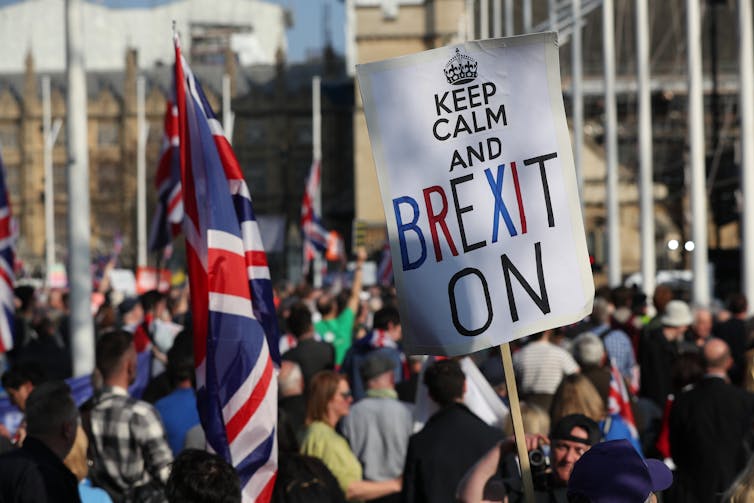With no deal in sight, people are justifiably anxious about Brexit. A new poll by the research company Britain Thinks found just under two-thirds of people surveyed believe the uncertainty over Brexit is bad for people’s mental health.
Mental health experts are warning that these anxieties are indeed cause for concern. But their warnings may have serious political consequences.
Declaring Brexit-related anxiety a national phenomenon, BBC Radio 4’s PM programme discussed this issue on March 28 – the day before the UK was scheduled to leave the EU. Listener accounts of Brexit anxiety were paired with expert “remedies” for coping with the “condition”. Among the experts was a GP, who urged that the best way to deal with Brexit anxiety was for people to take control of the things they can control, such as sleeping, eating, exercising, and limiting their exposure to social media.
This might seem like reasonable advice. For some vulnerable people, it probably is. Anxiety is painful and can be debilitating. Yet there is something deeply suspect about framing the anxiety that people in general have about Brexit as an individual issue subject to medical expertise. First, Brexit anxiety clearly has a political cause. Second, framing it as a medical problem seemingly rests on the assumption that people are unable to influence the political situation and that they should simply accept this and focus on themselves.
My research shows that the BBC’s treatment of Brexit anxiety is far from an isolated example. Since the referendum on Britain’s membership in the EU in June 2016, journalists, mental health experts and other observers have warned of the dire effects of Brexit anxiety. These warnings were particularly common and alarmist in the weeks and months following the referendum. Newspapers reported, with little evidence, that emotional people were flooding mental health clinics, which were creaking under the pressure. Therapists and psychiatrists reached out to offer their advice on how to deal with Brexit anxiety.
These experts called on anxious people to acknowledge their lack of control in the face of Brexit, disconnect from news and social media, and focus on the things that really matter, such as family, friends and work. Failure to follow this advice could mean spiralling into serious mental disorder. Some workplaces have taken this seriously, offering mental health resources and workshops to help their employees deal with their Brexit anxiety.
With anxiety comes action
Negative emotions have a bad reputation, especially in politics. Anxiety, anger and other emotions sometimes lead us to act rashly or without evidence. Still, I think most people recognise that negative emotions can also play a constructive political role. After all, we usually take political action because some perceived problem in the world has evoked negative emotions in us and we persist in our action partly because such emotions fuel us. By acting politically, we may not only address the cause of our distress, but, in the process, the joy of action may, at least for a time, replace our anxiety.
Read more: Why fear and anger are rational responses to climate change
But emotions can only play this role if we are able to channel them into political issues, such as Brexit. The media portrayal of Brexit anxiety undermines this ability. It implies that the negative emotions people feel about Brexit are potential mental health problems to be solved by a personal change, even though these emotions evidently have political causes and solutions.
Worryingly, the Brexit anxiety narrative also incorporates the disempowering misconception that because ordinary people cannot control politics they might as well focus on other things. But if the past few years have shown us anything it’s that not even the prime minister, Theresa May, can control political events. To paraphrase the political theorist Hannah Arendt, in politics, where we are always dealing with a plurality of ever-changing relationships between people, sovereign control is an illusion.

While the actions of ordinary people are obviously less powerful than those of elected politicians or business leaders, this doesn’t mean that they are incapable of shaping political issues under the right conditions. Recent weeks have shown us some of what is possible when people are able to channel their emotions politically. The mass of people who marched on London in late March demanding a second referendum may not have stopped Brexit. Neither did the thousands of Brexit supporters who gathered outside parliament force it through. Yet their actions have already shaped political discourse and will continue to shape it in ways that we cannot anticipate.
Expert warnings about the health risks of Brexit anxiety won’t stop protests like this from happening. But, by perpetuating the idea that good, healthy citizens keep calm and leave politics to the politicians, they may well keep many people at home at a time when their involvement could determine the future of the country.

